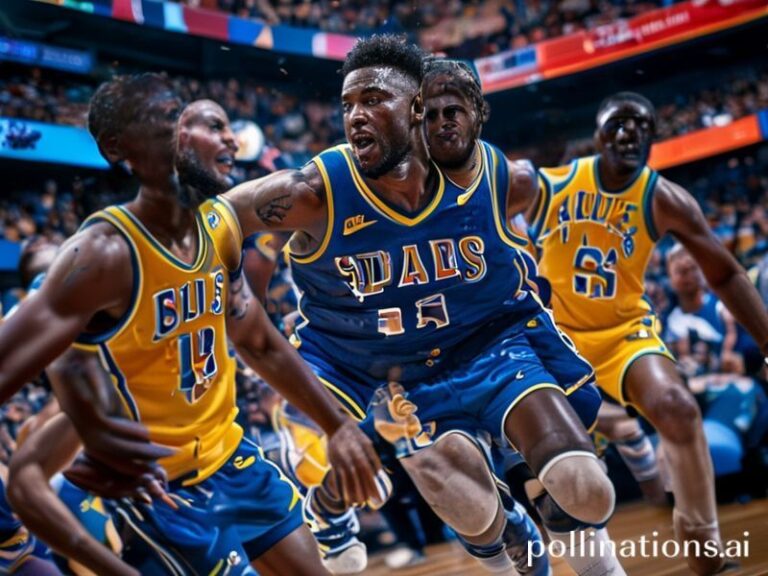Global Meltdown: How Mental Health Became the World’s Hottest Export (and Everyone’s Crying)
Global Meltdown: How the World’s Collective Nervous Breakdown Became the Ultimate Status Symbol
By the time the WHO upgraded “burnout” from a trendy complaint to an official diagnosis, the planet had already moved on to flashier disorders. From Manila to Minneapolis, mental health has become the new passport stamp: if you’re not anxious, are you even paying attention? In 2024, the global therapy market is worth an estimated $537 billion—roughly the GDP of Argentina, minus the inflation tantrums. Everyone, it seems, wants in on the action.
Start in South Korea, where the government now subsidizes midnight “crying rooms” for overworked salarymen. A businessman sobs into a tissue that costs more than his lunch, while an LED sign reminds him that “Your feelings are valid (for the next 30 minutes).” Hopscotch over to Sweden and you’ll find companies offering paid “climate anxiety leave,” because apparently the ice caps aren’t going to mourn themselves. Meanwhile, Brazilian fintech bros microdose ayahuasca between IPO pitches, convinced that enlightenment and Series C funding are the same thing.
The developing world watches this performance with the weary amusement of a bodega owner listening to trust-fund kids explain kombucha. In Kenya, community health workers treat PTSD caused by both cattle raids and Instagram; in Lebanon, therapists swap tips on how to ask clients to pay in dollars, lira, or expired airline miles. The common denominator is that suffering has become a commodity—packaged, monetized, and shipped FedEx International Priority.
The economic implications are deliciously cynical. Mood-tracking apps harvest panic attacks like truffle pigs, then sell the metadata to insurance companies who raise premiums on anyone whose heart rate spikes during push notifications. China’s AI chatbots comfort lonely teens by mining their diaries for keywords; the same keywords later appear in targeted ads for antidepressant tea. Even war zones have joined the gold rush: Ukrainian startups now export VR trauma therapy to shell-shocked Europeans who prefer their anguish with a 10% veteran discount.
Global institutions have responded with the enthusiasm of a substitute teacher discovering a fire drill. The UN’s new “Mind the Gap” initiative promises to halve the treatment shortfall by 2030, which is diplomatic speak for “we’ll commission another report.” At Davos, CEOs trade panic-attack stories like vintage wines, then fly home in jets whose carbon footprint alone could trigger a support group. And the World Bank, ever the life of the party, suggests that every dollar spent on mental health returns four in productivity—an ROI that conveniently ignores the profits lost when workers realize spreadsheets are not, in fact, a reason to live.
Yet beneath the market froth lies an inconvenient truth: humanity has weaponized unhappiness into social capital. Posting “I’m not okay” garners more likes than vacation photos; TikTok therapists become millionaires by diagnosing strangers through lip-sync. In this economy of affect, the sickest influencer wins. The logical endpoint arrives in Tokyo, where teenagers rent fake families to attend their therapy sessions, ensuring their abandonment issues have the proper dramatic arc for content.
Still, there are flickers of genuine solidarity. Peer-led groups from Lagos to La Paz swap coping strategies without a subscription fee. Indian farmers text each other breathing exercises between droughts; Icelandic unions negotiate four-day weeks so workers can stare into existential voids on company time. These grassroots efforts remind us that mental health, stripped of buzzwords, is simply the universal condition of being conscious while human.
So the next time a meditation app chirps that “it’s okay not to be okay,” remember that somewhere a Syrian refugee, a Tokyo office drone, and a Californian influencer are all medicating the same species-wide dread. The packaging differs, but the panic is global. And until the day we stop monetizing misery—or the planet actually does catch fire—we’ll all keep meeting, virtually or otherwise, in the waiting room of the world’s largest group therapy session. Bring your own tissues; the subscription ones are extra.







